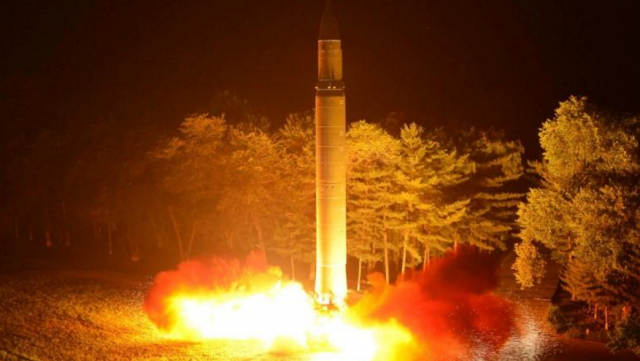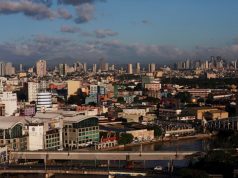
UNITED NATIONS – The United Nations Security Council unanimously imposed new sanctions on North Korea on Saturday that could slash by a third the Asian state’s $3 billion annual export revenue over Pyongyang’s two July intercontinental ballistic missile tests.
The US-drafted resolution bans North Korean exports of coal, iron, iron ore, lead, lead ore and seafood. It also prohibits countries from increasing the current numbers of North Korean laborers working abroad, bans new joint ventures with North Korea and any new investment in current joint ventures.
“We should not fool ourselves into thinking we have solved the problem. Not even close. The North Korean threat has not left us, it is rapidly growing more dangerous,” US Ambassador to the United Nations Nikki Haley told the council.
“Further action is required. The United States is taking and will continue to take prudent defensive measures to protect ourselves and our allies,” she said, adding that Washington would continue annual joint military exercises with South Korea.
North Korea has accused the United States and South Korea of escalating tensions by conducting military drills.
China and Russia slammed US deployment of the THAAD anti-missile defense system in South Korea. China’s UN
Ambassador Liu Jieyi called for a halt to the deployment and for any equipment in place to be dismantled.
Liu also urged North Korea to “cease taking actions that might further escalate tensions.”
US President Donald Trump hailed the vote in a Twitter message on Saturday evening.
“The United Nations Security Council just voted 15-0 to sanction North Korea. China and Russia voted with us. Very big financial impact!” Trump wrote.
US pressure on China
Russia’s UN Ambassador Vassily Nebenzia said he hoped recent remarks by US Secretary of State Rex Tillerson “were sincere – that the US is not seeking to dismantle the existing situation or to forcibly unite the peninsula or to militarily intervene in the country.”
While the Security Council has been divided on how to deal with other international crises like Syria, the 15-member body has remained relatively united on North Korea. Still, negotiating new measures typically takes months, not weeks.
North Korea has been under UN sanctions since 2006 over its ballistic missile and nuclear programs. The new measures came in response to five nuclear weapons tests and four long-range missile launches.
The United States negotiated with China for a month on the resolution, then expanded negotiations to the full council on Friday.
Washington, frustrated that China has not done more to rein in North Korea, has threatened to exert trade pressure on Beijing and impose sanctions on Chinese firms doing business with Pyongyang.
“We had tough negotiations this week,” Haley told reporters. “I think that the Chinese realized that the United States was going to push, but they responded and we appreciate how they cooperated with us during these negotiations.”
Liu, asked about US negotiating pressure, said China has been consistent on trying to achieve denuclearization, peace and stability on the Korean Peninsula and “to re-launch negotiations to achieve this end.”
He told reporters China was “opposed to any unilateral sanctions outside the agreed framework set by the UN Security Council resolutions.”
Russia-US cooperation
It had been unclear whether strained US-Russia relations would hamper negotiations on North Korean sanctions. On Wednesday, Washington imposed unilateral sanctions on Moscow to punish Russia over accusations of interference in the 2016 US presidential election and annexation of Ukraine’s Crimea.
“We are not hostages to our relations when we have to work together on issues which are far more important,” Nebenzia told Reuters.
The new UN resolution adds nine individuals and four entities to the UN blacklist, including North Korea’s primary foreign exchange bank, subjecting them to a global asset freeze and travel ban.
“I would think China and Russia signed on the sanctions hoping that they would force North Korea back to the negotiating table,” said Thomas Byrne, president of the New York-based Korea Society. “However, North Korea will try to evade the new sanctions.”
The new resolution completely bans North Korean exports of coal. In November the Security Council capped the country’s coal exports at $400 million annually. China, its largest buyer, halted imports in February.
A UN diplomat said North Korea had been expected to earn an estimated $251 million from iron and iron ore in 2017, $113 million from lead and lead ore and $295 million from seafood. The diplomat said it was difficult to estimate how much North Korea was earning from sending workers abroad.
A United Nations human rights investigator said in 2015 that North Korea has forced more than 50,000 people to work abroad, mainly in Russia and China, earning between $1.2 billion and $2.3 billion a year for the country’s government.
Joseph DeThomas, a former State Department official who worked as an adviser on Iran sanctions and previous rounds of North Korea sanctions, said freezing foreign labor will be difficult to enforce.
“Overall I doubt that $1 billion number. I doubt it will hit that hard in terms of economic damage,” he said. “You cannot expect North Korea to buckle for anything less than the sanctions imposed on Iraq in 1990.” These sanctions, he said, remain “a very long way” from there.









